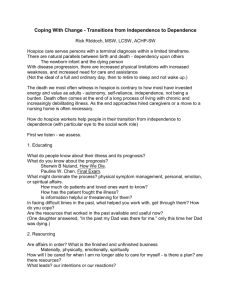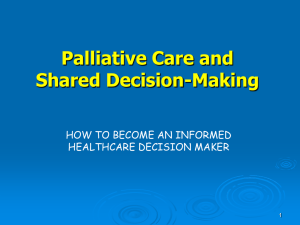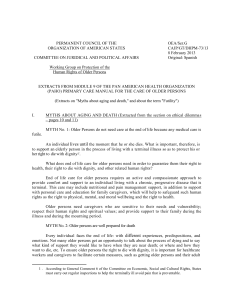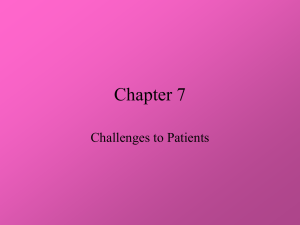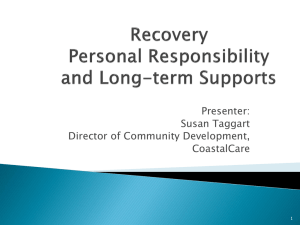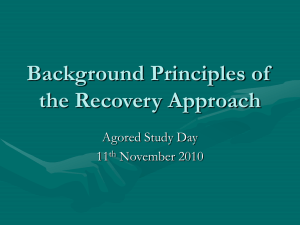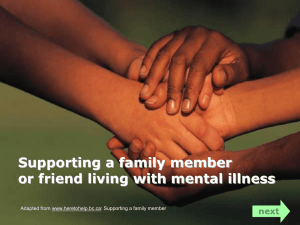How To Facilitate Those Crucial Conversations for Critical Care
advertisement
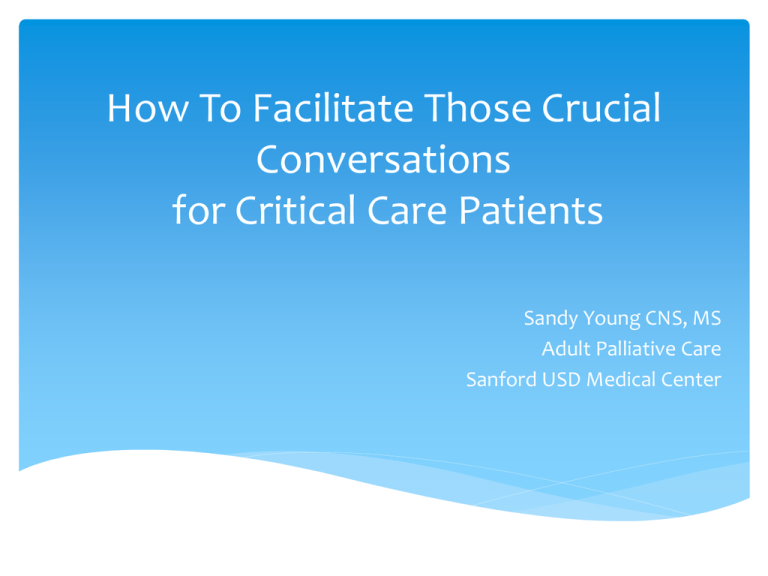
How To Facilitate Those Crucial Conversations for Critical Care Patients Sandy Young CNS, MS Adult Palliative Care Sanford USD Medical Center Early Identification of Patients on Dying Trajectory ICU Prognostic Models Acute Physiologic and Chronic Health Evaluation (APACHE) Mortality Probability Model (MPM) Simplified Acute Physiology Score (SAPS) Sequential Organ Failure Assessment (SOFA) All models predict rates of in-hospital mortality in population of critically ill patients But differ for predicting survival for an individual patient Does not indicate functional status, QOL, long term prognosis As a single data point can help to guide patient-centered decision-making As a screening tool to identify those ICU patients “in need” of palliative care evaluation As a research tool to look at the impact of interventions on mortality, morbidity and QOL What are the underlying chronic fatal illness diseases? What has been the clinical course of the chronic illness over the past few months/year? What has been the patient’s functional status and QOL prior to this admission? Illness/Dying Trajectories Sudden Death, Unexpected Cause Illness/Dying Trajectories Steady Decline, Short Terminal Phase Illness/Dying Trajectories Slow Decline, Periodic Crises, Death Illness/Dying Trajectories Lingering, Expected Death Determine The Surrogate Decision Maker Advance Directives Durable Power of Attorney for Health Care Five Wishes Sanford has a standard form Living Will Comfort One POLST (Physician Orders for Life-Sustaining Treatment - not recognized in SD at this time) Go Wish Cards http://gowish.org SD Health Care Consent Act • • • • • • • • • Court appointed guardian supersedes all of these DPOA for health care Spouse Adult child Parent Adult sibling Grandparent or adult grandchild Adult aunt or uncle, niece or nephew Friend Identify Patient Values and Wishes Determine patient values. Keep the focus on the patient. “Tell me about…; what kind of things did/does he like to do?” “Did you ever talk about what he would want if things did not go the way he hoped?” “Based upon your knowledge of his values and beliefs, what do you think he would do in this situation?” Patient/Family Meeting Determine if a meeting is needed Overall prognosis Who is the decision maker What s/s need management What are the family dynamics Clarify understanding of patient’s condition Patient/Family Meeting Location Who Introductions Determine what they know and understand Review medical status and clarify understanding Options for Ongoing Care Code Status Establish and Clarify Both Short Term and Long Term Goals of Care Outcome of the Meeting Short term goals Time limited trials Is the patient making improvement, stable or worsening Are there clinical changes that impact the ability to meet the desired goals What interventions will be needed What is pt/family understanding Long term goals Code Status 0% probability of success in the following clinical circumstances: Septic shock --Metastatic Cancer Acute stroke End stage diseases --Severe pneumonia In other clinical situations, survival from CPR is extremely limited: Hypotension (2% survival) --Persistent Vegetative State Renal failure (3%) --AIDS (2%) Homebound lifestyle (4%) --End stage diseases Age greater than 70 (4% survival to discharge from hospital) Code Status Discussions • Avoid Stating: – – – – “If your heart stops, would you like us to restart it?” “Do you want us to do everything?” “What do you want us to do if your heart stops?” “What do you want me to do if your (mom’s) heart stops?” – “There is nothing more we can do.” – “I think we should stop aggressive care.” Quality of Life Issues QOL is multi-dimensional How has diseased interfered with ADLs? How have you been getting along with family and friends as a results of your illness? What is your biggest concern or worry…? How have your religious beliefs been affected by your illness? Determined by Patient How can we help you live well? What is important to you? What special events are you looking forward to? “Hope” is the thing with feathers That perches in the soul And sings the tunes without the words And never stops at all --Emily Dickenson
